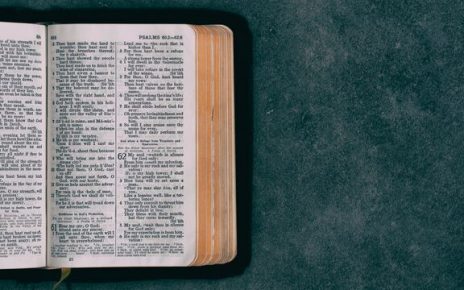Most people feel confused by Job’s action of cursing the day of his birth, because they think that our lives come from God and we should give thanks to God for giving us life, including the day of our birth, rather than curse it. Could it be that Job was unable to endure the pain and was complaining about God? Is this really the truth?
I have seen a passage in a book: “When Satan stretched forth its hand to afflict the bones of Job, Job fell into its clutches, without the means to escape or the strength to resist. His body and soul suffered enormous pain, and this pain made him deeply aware of the insignificance, frailty, and powerlessness of man living in the flesh. At the same time, he also gained a profound appreciation and understanding of why God is of a mind to care for and look after mankind. In Satan’s clutches, Job realized that man, who is of flesh and blood, is actually so powerless and weak. When he fell to his knees and prayed to God, he felt as if God was covering His face and hiding, for God had completely placed him in the hands of Satan. At the same time, God also wept for him, and, moreover, was aggrieved for him; God was pained by his pain, and hurt by his hurt…. Job felt God’s pain, as well as how unbearable it was for God…. Job did not want to bring any more grief upon God, nor did he want God to weep for him, much less did he want to see God pained by him. At this moment, Job wanted only to divest himself of his flesh, to no longer endure the pain brought upon him by this flesh, for this would stop God being tormented by his pain—yet he could not, and he had to tolerate not only the pain of the flesh, but also the torment of not wishing to make God anxious. These two pains—one from the flesh, and one from the spirit—brought heart-rending, gut-wrenching pain upon Job, and made him feel how the limitations of man who is of flesh and blood can make one feel frustrated and helpless. Under these circumstances, his yearning for God grew fiercer, and his loathing of Satan became more intense. At this time, Job would have preferred to have never been born into the world of man, would rather that he did not exist, than see God cry tears or feel pain for his sake. He began to deeply loathe his flesh, to be sick and tired of himself, of the day of his birth, and even of all that which was connected to him. He did not wish there to be any more mention of his day of birth or anything to do with it, and so he opened his mouth and cursed the day of his birth: ‘Let the day perish wherein I was born, and the night in which it was said, There is a man child conceived. Let that day be darkness; let not God regard it from above, neither let the light shine on it’ (Job 3:3–4). Job’s words bear his loathing for himself, ‘Let the day perish wherein I was born, and the night in which it was said, There is a man child conceived,’ as well as the blame he felt toward himself and his sense of indebtedness for having caused pain to God, ‘Let that day be darkness; let not God regard it from above, neither let the light shine on it.’ These two passages are the ultimate expression of how Job felt then, and fully demonstrate his perfection and uprightness to all. At the same time, just as Job had wished, his faith and obedience to God, as well as his fear of God, were truly elevated. Of course, this elevation is precisely the effect that God had expected” (“God’s Work, God’s Disposition, and God Himself II”).
I understood from the passage the reason why Job cursed the day of his birth when trials befell him. Job feared God and shunned evil and he was praised by God as a perfect man. But Satan remained unconvinced, and it accused Job before God. In order to prove that Job was a just man, God permitted Satan to tempt Job, and thereafter Job lost his property, children and mountains of sheep and cattle, and his whole body broke out in painful boils. As this trial unfolded, Job perceived how evil, deplorable and ugly Satan was; Satan hated anyone who feared God and shunned evil and it did not want anyone to worship God, and so it used all the means at its disposal to make people deny and betray God. When Job was suffering, he came to appreciate God’s concern for man, and he understood that God regarded man as His close kin and cared for man at all times; he understood that God forgave man’s weaknesses and that God did not want to see man harmed by Satan and suffering all manner of pain. When Satan harms man, God’s heart bleeds. When Job perceived that God grieved and suffered for his sake, he reproached himself and he did not want to cause God any pain. And so, he spoke and cursed the day of his own birth, wishing rather that he had never been born into the world than that God should suffer for his sake. Job’s action arose entirely from his love and consideration for God, and even more from his faith and obedience to God. That Job could express such a thing in such extreme pain is so admirable.
Before Job was tried, Jehovah God said in front of Satan: “There is none like him in the earth, a perfect and an upright man, one that fears God, and eschews evil” (Job 1:8). This is God’s evaluation of Job. Whether it was before or after his trials, Job was able to be utterly upright, fear God and shun evil, which proved that God’s assessment of him was entirely correct. We just see the surface of things and we judge them to be right or wrong by relying on what we see with our eyes. Yet God, the Creator, scrutinizes the innermost heart of man and He sees our essence, and He sees in perfect clarity who is a God-fearing person and who is utterly devoted to Him. Therefore, when we meet with people or things in the future which we are not able to fully understand, then we must not just look at their outward form, much less judge or condemn them arbitrarily. Instead, we must come before God to pray, seek God’s will and seek the truth with a God-fearing heart. Only in this way can we see the essence of the problem.



